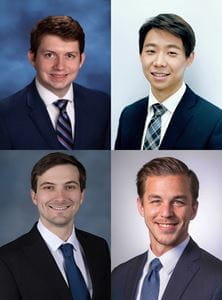The Department of Otolaryngology at Indiana University School of Medicine expanded its residency program in 2021, matching with four trainees instead of three.
With the COVID-19 pandemic halting in-person interviews, this year’s residency season was unlike any other. However, the four newly matched medical students say the tight-knit and supportive environment of the Department of Otolaryngology stood out through their virtual residency interview as well as informal Zoom sessions with residents and faculty.
Vincent Campiti, Christopher Park, Douglas Totten—all Indiana natives—and Harrison Thompson will soon join 12 others in the department’s five-year residency program.
We reached out to them to hear about their interest in otolaryngology and IU School of Medicine.
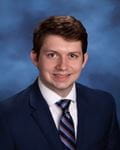 Vincent Campiti, IU School of Medicine
Vincent Campiti, IU School of Medicine
Where did you grow up?
South Bend, Indiana.
What is your medical school/undergraduate background?
Medical School: IU School of Medicine
Undergraduate: Indiana University, bachelor’s in biology and biochemistry
Why are you pursuing a career in ENT?
ENT is an awesome field! You are trained in a range of surgeries using microscopes, endoscopes and open techniques on the complex anatomy of the head and neck. I like the opportunity to have both kids and adults as patients, and in the end, you can have a tremendous impact on your patients’ lives. I also had fantastic mentors along the way that showed me how special this field can be.
What intrigued you about IU School of Medicine?
I went to IU School of Medicine for medical school, and I always liked what I saw when I had the chance to do an ENT rotation. The faculty and residents here are great, down-to-earth people. All the chief residents that I have worked with are well-trained, comfortable and ready for the next steps of their career, whether that is general otolaryngology or a competitive fellowship. In addition, the ENT department has expanded quite a bit in the past few years, and I think that it will only continue to get better.
How was the virtual residency interview process?
Everything went pretty well overall. By the time interview season came around, I think the faculty at different programs were comfortable communicating on a virtual platform, so you could still get a feel for the culture of a program. In addition, many programs came up with unique ways to make their program stand out.
What do you want to learn most from the faculty and residents in the Department of Otolaryngology?
I want to learn to be a great surgeon capable of giving my patients the best outcomes possible. I still am not sure about pursuing a fellowship versus a career as a general ENT, but I think being comfortable and competent in general otolaryngology is important regardless by the end of the residency.
What are some of your hobbies?
Spending time with family, guitar, whiskey tasting.
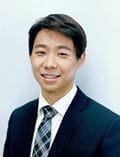 Christopher Park, Icahn School of Medicine at Mount Sinai
Christopher Park, Icahn School of Medicine at Mount Sinai
Where did you grow up? West Lafayette, Indiana.
What is your medical school/undergraduate background?
Medical School: Icahn School of Medicine at Mount Sinai Undergraduate: Dartmouth College, bachelor’s in computer science modified with biology
Why are you pursuing a career in ENT?
I was always drawn toward surgery because of how meditative and methodical I found the OR. As we made our way through the body, first in anatomy class and then on our third-year rotations, the cases that stuck most with me were the ones in the head and neck. I think the anatomy of the head and neck is exceedingly intricate and is a world in itself. On top of this, there are countless ways to become involved in advocacy and clinical opportunities with the LGBTQ+ population in otolaryngology, particularly through gender affirmation surgeries and therapies.
What intrigued you about IU School of Medicine?
Even over Zoom, what made IU School of Medicine stand out was undoubtedly the palpable feel of a nurturing and family-like culture in the context of world-class training. I think that this culture was exemplified through the whole otolaryngology family at IU from the interns all the way to the most senior faculty.
How was the virtual residency interview process?
I don’t have an in-person experience to compare, but I don’t think much was lost in comparison to the vast cost savings.
What do you want to learn most from the faculty and residents in the Department of Otolaryngology?
Being in a growing generation and culture of hyper-specialization, I want to first learn how to be an exceptional general otolaryngologist. I may choose to specialize myself, but I think the core of being a great physician and surgeon is about honing and holding onto the basics. Aside from this, I hope to learn how to integrate my career goals within otolaryngology with my personal goals—just life skills, I suppose.
What are some of your hobbies?
Rock climbing; cooking, trying new restaurants; coffee; trying to run more than 2 miles; learning about cryptocurrency; K-pop, K-R&B; budget-friendly traveling.
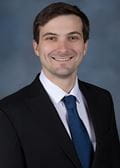 Harrison Thompson, University of Alabama School of Medicine
Harrison Thompson, University of Alabama School of Medicine
Where did you grow up?
Charlottesville, Virginia, and Mobile, Alabama
What is your medical school/undergraduate background?
Medical school: University of Alabama School of Medicine
Undergraduate: Auburn University
Why are you pursuing a career in ENT?
When I went through my third-year clerkships, I found myself loving every ENT rotation. I loved doing everything from clinic work to OR work to small procedures and more! ENT lets you do it all with an added bonus of working with some of the nicest physicians and patients out there!
What intrigued you about IU School of Medicine?
I left my interview day with IU School of Medicine thinking three things: IU cares about and supports their residents; IU sets up their residents for success after residency; and the physicians and residents at IU were some of the nicest people on the interview trail! I was thoroughly impressed and am happy to be a part of a program that exemplifies these qualities.
How was the virtual residency interview process?
It wasn’t bad at all! I hate that I missed out on getting to meet my co-applicants in person and seeing different cities, but the online process definitely made interviewing easier logistically.
What do you want to learn most from the faculty and residents in the Department of Otolaryngology?
IU Otolaryngology has faculty that trained and practiced at a variety of institutions and countries. I’m excited to work with such a diverse group of people and to learn from the variety of perspectives and techniques they use when approaching their surgical cases.
What are some of your hobbies?
Backcountry camping, SCUBA and traveling!
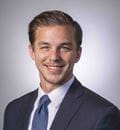 Douglas Totten, Vanderbilt University School of Medicine
Douglas Totten, Vanderbilt University School of Medicine
Where did you grow up?
Hanover, Indiana
What is your medical school/undergraduate background?
Medical School: Vanderbilt University School of Medicine
Undergraduate: Carleton College, bachelor’s in chemistry
MBA: Vanderbilt Owen Graduate School of Management, concentrations in health care and operations and analytics
Why are you pursuing a career in ENT?
My interest in ENT was initially sparked at 12 years of age when I had a tympanomastoidectomy to remove a pretty gnarly cholesteatoma. (I recently went back and read the op note!) As a result, I wanted to check out ENT. I immediately felt at home with the attendings, residents, and OR and have continued to dive deeper into the field and get more excited about my future career as time has passed.
What intrigued you about IU School of Medicine?
In addition to being close to home and in a city that I’m extremely fond of, IUSM has such a broad capture area, a great mix of hospitals all close together, an excellent reputation, a wide variety of cases, and a fantastic and motivated group of leaders and residents, particularly in the ENT department!
How was the virtual residency interview process like?
It was certainly different, but it’s all I really know. Saving money was nice, missing out on cool trips was less so. Overall, however, I think it worked fairly well.
What do you want to learn most from the faculty and residents in the Department of Otolaryngology?
How to be a world-class surgeon. Most of my research has been in ears, so I’ll be excited for those cases, too. Overall, I’m simply excited to learn more than I can fathom at the moment.
What are some of your hobbies?
Distance/marathon running (I recently qualified for the Boston Marathon while running Carmel!); homebrewing; music (guitar/piano/tenor sax/others); sports (pretty much all of them; particularly football, and, of course, basketball as a Hoosier).
